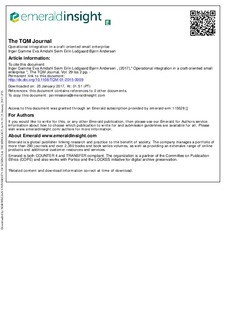Operational integration in a craft-oriented small enterprise
Original version
10.1108/TQM-01-2015-0009Abstract
Purpose
Many leisure boat manufacturers have thrived on designing and building highly customized boats based on longstanding traditions of craftsmanship. To achieve efficient value chains, it is not enough to optimize each process step, but also important to achieve a smooth flow through the dependencies between each process steps. The purpose of this paper is to focus on assessing enablers and disablers for operational integration in a craft-oriented small enterprise.
Design/methodology/approach
One case company has been studied, to identify enablers and disablers for operational integration in the value chain. The research methodology is based on semi-structured interviews with selected persons from different levels within the company.
Findings
The results indicate the importance of management promotion and support of integration and a strong relationship between foremen and operators. Furthermore, to avoid functional myopias, mechanisms to encourage horizontal integration could be useful. Small company and informal culture make integration easier. However, to further establish a common standardized platform, could be necessary. Even small physical barriers in the layout were experienced to affect the integration negatively.
Research limitations/implications
This has been an exploratory study of one single craft-oriented enterprise; hence it is difficult to generalize.
Practical implications
Based on empirical findings from the case study, recommendations on how to achieve better operational integration will be presented.
Originality/value
The research initiative provides knowledge experience of operational integration from a case study in one company within craft and artisan sector in Norway.
